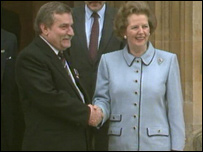|
Unit 6B: Ideological Development in the UK
Rodney Barker
Professor at Government Department of the London School of Economics writes for BBC Parliament
|


Left and right shake hands against Soviet communism
|
The two most significant dates for the development of political ideologies in the United Kingdom in the Twentieth Century and after were 1917 and 1989.
The years between are sometimes referred to as the 'short twentieth century'.
The Russian Revolution of 1917 inaugurated a period when socialism and capitalism provided the two chief models for organising economy and society.
 |
ALSO IN THIS SECTION: Unit 6B - Ideological Development in the UK
|
Political thinking, with some important exceptions, could be located on a scale running from one to the other.
For the right, the Soviet Union provided the model of all it opposed: public ownership, secularism, state regulation of the economy.
An ideological opponent was at the same time a hostile foreign state so that the Cold War became the diplomatic aspect of a map whose other dimension was ideological.
For the left, the Soviet Union was an example of a vision corrupted, but a vision which, ethically, lay on the correct side of the fence, and where production was for the common good rather than for individual profit.
The ideological landscape was transformed with the revolutions of 1989 which saw the undermining, overthrow, or abdication of state communism in Eastern Europe and the Soviet Union, and the end of the Cold War .
The old friends and the old enemies no longer existed, or if they did they no longer had the same significance. A new era began, and continues, characterised by variety, fluidity, and uncertainty.
It is sometimes described as post modernity, as a way of saying not so much what it is, but what it is not.
Not only was there far greater diversity in political beliefs, but the familiar clusters of aspirations and aversions which had constituted socialism, liberalism, and conservatism, dissolved, so that, for instance:-
A nationalist could employ a conservative view of the nation, a socialist view of the economy, and a liberal view of the constitution
A communitarian could employ a conservative view of society and a socialist view of the economy.
An environmentalist could argue for a conservative human stewardship of the inherited natural world, but a socialist solution for environmental preservation. New meanings of old ideologies
Whilst the short twentieth century was characterised by socialism, liberalism, and conservatism, with feminism as a minor theme, what may come to be know as the 'long twenty first century' beginning around 1989 is characterised, at its start, by a fluid confusion of feminism, nationalism, religious based politics, environmentalism, and constitutional experiment.
Issues of gender, ethnicity, nation, and religion have a new importance, and have rivalled or replaced older lines of ideological conflict such as class.
This fluidity and unpredictability affected political parties, which lost their traditional moorings in conservatism and socialism.
A conventional distinction is made between an ideology such as conservatism, with a lower case first letter, and a party associated with that ideology, such as the Conservative Party, with a capital 'C'.
While there was still a Conservative Party, it was wrenched from its traditional ideological roots by Thatcherism and the New Right, whilst the Labour Party's leadership sought to distance itself from its socialist past by, briefly, renaming itself 'New' Labour.
© Rodney Barker 2004
Department of Government
London School of Economics & Political Science
